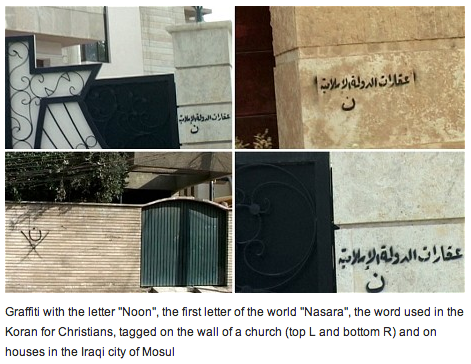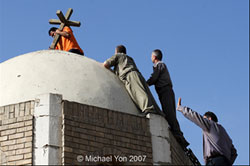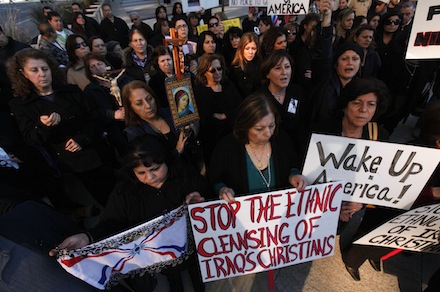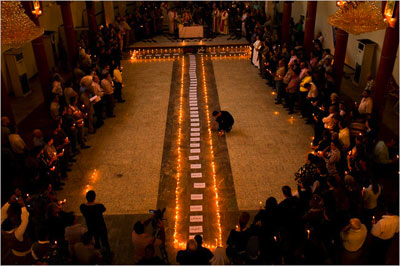The Holy Father is following with deep concern the dramatic news reports coming from northern Iraq, which involve defenseless populations. Christian communities are particularly affected: a people fleeing from their villages because of the violence that rages in these days, wreaking havoc on the entire region.
At the Angelus prayer on July 20th, Pope Francis cried with pain: “[O]ur brothers and sisters are persecuted, they are pushed out, forced to leave their homes without the opportunity to take anything with them. To these families and to these people I would like to express my closeness and my steadfast prayer. Dearest brothers and sisters so persecuted, I know how much you suffer, I know that you are deprived of everything. I am with you in your faith in Him who conquered evil!”
In light of these terrible developments, the Holy Father renews his spiritual closeness to all those who are suffering through this painful trial, and makes the impassioned appeals of the local bishops his own, asking together with them in behalf of their sorely tried communities, that the whole Church and all the faithful raise up with one voice a ceaseless prayer, imploring the Holy Spirit to send the gift of peace.
His Holiness urgently calls on the international community to protect all those affected or threatened by the violence, and to guarantee all necessary assistance – especially the most urgently needed aid – to the great multitude of people who have been driven from their homes, whose fate depends entirely on the solidarity of others.
The Pope also appeals to the conscience of all people, and to each and every believer he repeats: “May the God of peace create in all an authentic desire for dialogue and reconciliation. Violence is not conquered with violence. Violence is conquered with peace! Let us pray in silence, asking for peace; everyone, in silence.... Mary Queen of peace, pray for us! (Angelus, July 20, 2014)”
Statement of Fr Federico Lombardi SJ regarding the situation of Christians in Iraq

- Islamic State Torches 1200 Rare Christian Manuscripts 08/10/14:
Members of the Islamic State, the new “caliphate,” recently seized as many as 1,200 rare, Christian manuscripts, and set them aflame.
The manuscripts were seized from the churches of Mosul, which are under the control of the Islamic State. Many of these churches have stood in Mosul since the times of the apostles of Christ. ...
The Islamic State also took over and destroyed the Museum of Antiquities in Mosul, the second most important museum of ancient history in Iraq, which once housed some of the most important artifacts of early human history.
- U.S. Approves Airstrikes on Iraq, Airdrops Aid Wall Street Journal 08/08/14.
- Iraq's largest Christian town falls to Islamic State Long War Journal 08/07/14:
"Qaraqosh, Tal Kayf, Bartella and Karamlesh have been emptied of their original population and are now under the control of the militants," Joseph Thomas, the archbishop of the Iraqi cities of Kirkuk and Sulaimaniyah, told AFP. Qaraqosh (or Bakhdida on the map) has a Chaldean Christian population estimated at 50,000. ...
The Islamic State previously issued an ultimatum to Christians in Mosul that they convert to Islam, pay a tax, or be killed. Thousands of Christian families fled Iraq's second largest city after the Islamic State issued their directive. The Islamic State has also been destroying Christian, Jewish, and Muslim shrines, churches, and mosques in Mosul. Among the religious sites destroyed by the jihadist group are the tomb of Jonah and an accompanying mosque, and the tomb of George.
- Islamic State pulls down church crosses in northern Iraq as 200,000 flee The Telegraph UK. 08/07/14. "Islamic State, the jihadist group formerly known as Isis, have occupied churches in Iraq, removing crosses and destroying manuscripts, witnesses report, having overrun Kurdish troops forcing 200,000 to flee."
- World's top Muslim leaders condemn attacks on Iraqi Christians Vatican Radio / Reuters. 07/25/13:
Two of the leading voices in the Muslim world denounced the persecution of Christians in Iraq, at the hands of extremists proclaiming a caliphate under the name Islamic State.
The most explicit condemnation came from Iyad Ameen Madani, the Secretary General for the Organization of Islamic Cooperation, the group representing 57 countries, and 1.4 billion Muslims.
In a statement, he officially denounced the "forced deportation under the threat of execution” of Christians, calling it a "crime that cannot be tolerated.” The Secretary General also distanced Islam from the actions of the militant group known as ISIS, saying they "have nothing to do with Islam and its principles that call for justice, kindness, fairness, freedom of faith and coexistence.”
- Islamic State destroys tombs, mosques in Mosul Long War Journal 07/26/14:
On July 24 the Islamic State destroyed the Nabi Yunus Mosque, which had housed the Tomb of Jonah, after destroying the tomb itself earlier this month. Islamic State fighters wired the mosque with explosives and detonated the religious site in broad daylight.
Jonah is recognized as a prophet in Judaism, Christianity, and Islam, and his tomb was visited and revered by members of all three religions.
- Muslims in Baghdad Express Solidarity With Christians Aleteia. 07/21/14:
A group of about 200 Muslims joined Christians in solidarity in front of the Chaldean Church of St. George Sunday to condemn the attacks on the Christian community in Mosul carried out by the Islamic State.
Some Muslims held up signs or wore shirts with the words "I am Iraqi, I am Christian," written on them. Others marked themselves with a “nun,” the first letter of the Arabic word for Christian, "Nasrani" or Nazarene. The Islamic State has been putting “nuns” on Christian property marked out for seizure.
The Chaldean faithful who joined them after Mass sang the national anthem along with them, as Patriarch of Babylon of the Chaldeans Louis Raphael I Sako thanked them.
- Iraqi Police: Abu Risha, head of Ramadi Awakening Council, killed [by Islamic State of Iraq] CNN. 06/03/14.
The head of the Ramadi Awakening Council was killed Tuesday in a suicide bombing in Iraq's Anbar province, police officials told CNN.
Mohammed Khamis Abu Risha was on a joint patrol with Awakening Council members and Iraqi security forces when he was killed by a suicide bomber ...
Abu Risha has been among those leading the fight in Ramadi against the Islamic State of Iraq and Syria, a rogue al Qaeda group know by the acronym ISIS.
There was no immediate claim of responsibility. But ISIS has claimed to have carried out several failed assassination attempts against him in recent months.
Abu Risha is the nephew of Sheikh Ahmed Abu Risha, head of the Anbar Awakening Council -- a group composed primarily of Sunni Arab fighters who turned on al Qaeda in Iraq in late 2006 and joined forces with the U.S.-led coalition.
The sheikh took over as head of the province's Awakening Council after his brother Sheikh Abdul Sattar was assassinated [by Al Qaeda] in 2007.
- Iraqi Sheik to Obama: We Miss You! The Daily Beast 09/06/12:
A little more than four years ago in western Iraq, then-senator Barack Obama met for 90 minutes with a group of Arab sheiks, allies of the U.S. military in the war against al Qaeda. Known as the Anbar Awakening, the tribal leaders are credited by the Marine Corps’ own official historian with helping turn the tide of the Iraq War and creating the conditions on the ground for the country’s fragile government to survive. During the meeting the future president assured the group that there would be a long-term partnership between America and Iraq, according to two of the sheikhs who were there and a U.S. translator in the meeting. ... Four years later, one of those sheiks, Ahmad Abu-Risha, says he feels betrayed.
- Leaving the Sunni Awakening in Limbo New York Times 12/14/11.
Sheik Ahmed Abu Risha is seen as America’s staunchest ally in Iraq. An article in Wednesday’s Times reports on how the withdrawal of the United States will leave Mr. Abu Risha and the militia units he commands, known broadly as the Sunni Awakening, to navigate increasingly troublesome relations with the central Shiite-led government of Iraq.
- Anbar Awakening Leader questions Obama's plan of withdrawal 07/22/08. "In the present, we do not have an army that can protect the country after the US forces leave. This army is not capable enough."
- FLASHBACK: The Vatican, The Anbar Awakening, and the "Protector of the Chaldean Catholics" 05/01/08.
After hearing Sheikh Iyad's account of the suffering that the Chaldean Catholics have endured in Iraq, Sheikh Ahmad publicly declared that from this time forward they would be under his protection, that anyone who killed a Chaldean will be regarded as one who has killed in a member of his tribe (under the medieval Islamic concept of qisas this is a capital offense), and money will be provided from the Sahawa al-Iraq treasury to rebuild the churches and cemeteries that al-Qaeda destroyed. He justified this by quoting from the Qu'ran and stating that there should be no compulsion in matters of religion because truth stands free from error.
- FLASHBACK: Reunion of Iraqi Christians and Muslims 12/15/07:
On November 19, 2007, Most Reverend Shlemon Warduni, Auxiliary Bishop of the St. Peter the Apostle Catholic Diocese for Chaldeans and Assyrians in Iraq officiated at a mass in St. John’s Church in Baghdad. He was welcomed home by a crowd of locals and American soldiers, who had fought hard to cleanse the streets of Al Qaeda. ... According to [reporter] Michael Yon, the front pews of the Mass were filled with Muslims, to express their solidarity with their Christian neighbors and invite them back to Iraq.
 FLASHBACK: "Thanks and Praise": The rebuilding of St. John's Church in Baghdad 11/08/07:
FLASHBACK: "Thanks and Praise": The rebuilding of St. John's Church in Baghdad 11/08/07:"I photographed men and women, both Christians and Muslims, placing a cross atop the St. John's Church in Baghdad. They had taken the cross from storage and a man washed it before carrying it up to the dome. A Muslim man had invited the American soldiers from 'Chosen' Company 2-12 Cavalry to the church, where I videotaped as Muslims and Christians worked and rejoiced at the reopening of St John's, an occasion all viewed as a sign of hope. The Iraqis asked me to convey a message of thanks to the American people. 'Thank you, thank you,' the people were saying. One man said, 'Thank you for peace.' Another man, a Muslim, said 'All the people, all the people in Iraq, Muslim and Christian, is brother.' The men and women were holding bells, and for the first time in memory freedom rang over the ravaged land between two rivers.








